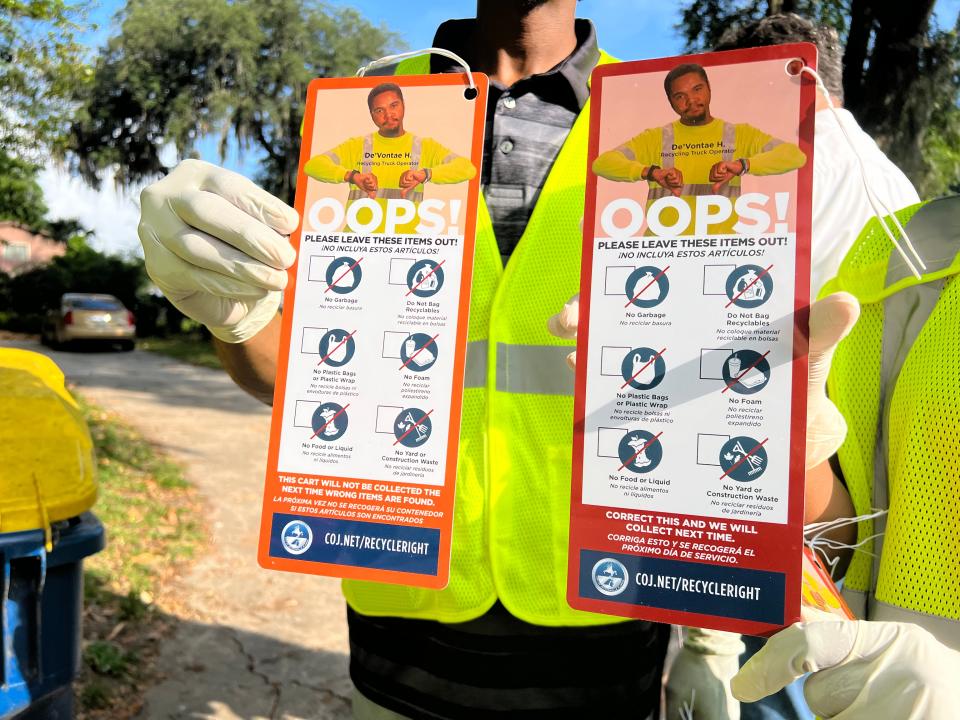Using AI to help decontaminate recycling? Jacksonville considers greener future
The future of recycling in Jacksonville could eventually involve the use of artificial intelligence, or even a tool for residents to determine if specific products could be recycled, as the city pursues efforts to save money through decontamination.
The city has been working for about two years to improve its recycling program, from mailing refrigerator magnets to launching an app to help residents keep track of recycling days and correct materials. Its latest project, an educational program that took “recycling assessors” across the city, will save over $70,000 a year, a recent audit found.
Still, officials are already looking toward next steps: expanding and modernizing the program during a time of national industry growth.
Jacksonville recycling initiative comes to a close, lowers trash contamination rate
'Not trying to be recycling police: ' Recycling bin inspections start in Jacksonville
“We've met the goal of educating the public,” Eric Fuller, the city’s environmental programs manager, told the Times-Union. “We just need to keep the momentum going and just let them know that the trucks coming down your street, whether you put a cart out or not, so you might as well.”
The city completed its most recent audit of the city's curbside recyclable materials in early March after completing "Feet on the Street" project with The Recycling Partnership, a Washington-based nonprofit. The goal of the program was to assess every recycling bin in the city, inform residents if they were contaminating the materials with garbage and ultimately reduce the overall contamination rate.
The city and the Florida Beverage Association, with American Beverage, each contributed $560,000 to make the Jacksonville program the largest The Recycling Partnership has ever completed. Representatives from the groups came to City Hall Tuesday to announce the results of the audit and discuss next steps.
Plastic bags are biggest recycling contaminants, city says
Residents may have spotted an orange or red tag on their recycling bin last year — a calling card of the program. The cards outlined what accessors saw in the bin that could not be recycled.

Accessors, hired by the nonprofit, went four times to every bin in the city looking for improvement from May to December of last year.
“We identified the biggest contaminant, which was plastic bags, and people bagging the recyclables,” Fuller said. “We kind of anticipated that. That's common for these types of programs across the whole country.”
In response, they sent out a targeted mailer to each home where plastic bags were found.
By reducing the overall amount of trash in recycling, the city not only decreases the amount of materials that go to the local landfill, but it also saves money on its contract with the recycling processing company.
If more than 10% of the materials collected cannot be recycled, Republic Services transports it to Trail Ridge Landfill and charges the city. Before the COVID-19 pandemic, the contamination rate was around 19%. After the city suspended and restarted the program in 2022, the rate jumped to 27%.
The newest rate of around 21.6% will save the city between $70,000 and $80,000 annually, Fuller said.
“It costs us about three times as much to dispose of garbage when it goes in your recycle cart, and we have to pay the processing fee at the recycling facility and then they have to take it to the landfill,” he explained.
The plan originally included removing the recycling cans of residents who were obviously using the bin as a garbage can, but public works decided it did not want “a negative light” to be put on the program.
But, if haulers realize a bin is full of garbage, they will not pick it up.
"We started in my neighborhood, and it was a wonderful program," Ron Salem, the City Council president, said. He sponsored the outreach program in City Council and pushed for a pilot composting program last year. "By meeting people where they are and providing hands-on assistance, we have been able to make a real difference in how our community approaches recycling."
What’s next?
The audit revealed a lower recycling participation rate than the city expected of around 47%, Fuller said. The haulers estimate the true number to be around 60%, but the city is still looking to involve more residents.
“I think the key now is to grow it,” Salem said. “We’ve got to get more people involved.”
To that end, public works will continue to work with The Recycling Partnership to find potential grants to improve their technology and outreach.
One option includes using AI to identify the contaminants of each individual recycling bin as it get dumped into the hauling truck, which could automatically send the resident an informational flyer if it spots something like a plastic bag.
The city is also trying to register with a national database that would allow residents to scan a QR code on participating products to see if they are recyclable specifically in Jacksonville.
But, other green programs, like the recently completed city-sponsored compositing pilot for restaurants, have stalled. The city partnered with Sunshine Organics last year for the pilot, but the company would need to be able to pick up large amounts of food waste to make the project permanent, Salem said.
The mayor’s administration supported the expanded recycling efforts and would work to assist in finding federal grants to help fund new technologies.
"Here's what increased recycling means: using less energy, saving our resources and taking up less landfill space," Melissa Ross, a spokesperson for the mayor's office, said Tuesday. "All of that means saving taxpayer dollars and protecting our planet."
Fuller encouraged people to download the city’s mobile app. Residents can either receive their first recycling bin for free from the city or even buy a second can by calling 630-CITY or going online.
This article originally appeared on Florida Times-Union: Jacksonville plans expansion, greener recycling program

